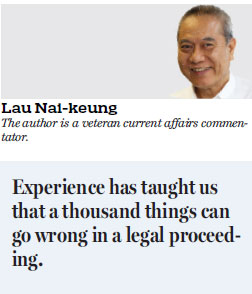Rejection of student's attempt to unseat lawmaker questionable
Updated: 2017-08-09 09:53
(HK Edition)
|
|||||||||
The court on July 27 ruled plaintiff Mok Ka-kit would not be in a position to unseat lawmaker Lau Siu-lai as he did not vote in her constituency in Kowloon West. The High Court ordered Mok to withdraw the case and pay Lau's legal fees.
Lau has already been disqualified as the outcome of another legal action, so why the trouble for Mok? And why should we care? The reasons are manifold.
On Nov 15 last year Justice Thomas Au of the Court of First Instance of the High Court delivered a judgment on whether the oath-taking of Sixtus Leung Chung-hang and Yau Wai-ching on Oct 12 complied with the relevant legal requirements. Justice Au ruled against Leung and Yau.
Leung and Yau appealed. After considering the interpretation of Article 104 of the Basic Law adopted by the National People's Congress Standing Committee on Nov 7, the relevant case law and other laws, the Court of Appeal dismissed their appeals on Nov 30 and upheld the judgment of Justice Au.

After the Leung and Yau case was settled, the government commenced legal proceedings against four more Legislative Council members, including Lau, and requested the court to declare their oaths purportedly taken as invalid and their office as now vacant.
Then something peculiar happened. A few days later, on Dec 7, the court asked Mok to address the court on whether he had sufficient locus in bringing the judicial review seeking relief against Lau. Locus, short for locus standi, is the ability of a party to demonstrate to the court sufficient connection to and harm from the law or action challenged to support that party's participation in the case.
A more reasonable question for the court to ask Mok would be something like: "Look, the government is now also doing the same thing that you have been trying to do. In view of this new information, will you withdraw your case?" It was true that Mok's locus was somehow affected by the government's new proceedings but an enquiry entirely focused on the matter of Mok's locus seemed uncalled for at that time.
Mok's lawyers were more clear-headed. On Dec 12, they wrote to the court seeking a stay of these proceedings, pending the determination of the government's above-mentioned judicial review. The lawyers also asked the court to postpone the address on the question of Mok's locus until after a lift of the stay.
The approach of Mok's side was sensible. At that time, the government was "a better-placed challenger" (using Justice Au's words) and the existence of which affected Mok's locus. But things might well again change after the government's judicial review was concluded.
Experience has taught us that a thousand things can go wrong in a legal proceeding. Many of which can be pure technicalities - a criminal can walk because the police forgot to caution him. Mok's decision to wait and see is prudent; if the government messed up, all would not be lost.
In his ruling on Mok's case, Justice Au again paid a lot of attention to Section 73 of the Legislative Council Ordinance, which is titled "Proceedings against persons on grounds of disqualification". The logic or lack thereof in his discussion is worth noting because this section is often referred to in the oath-taking related cases.
Section 73 of the ordinance provides the legal avenue for a person to take out legal proceedings seeking those substantive declarations against a LegCo member who has been disqualified but has continued to act or claimed to be entitled to act as a LegCo member. Section has required that only an elector or the secretary for justice can bring proceedings under Section 73.
In his judgment, Justice Au quoted approvingly Lam VP in CE v The President of LegCo: "In any event, given that Section 73 was enacted to protect members of the LegCo against unlimited challenges to their offices, I believe even in cases where an applicant is outside the scope of that section and an application is brought by way of judicial review, the court must bear such protection in mind in assessing whether leave should be granted."
By some rather unclear reasoning, Justice Au was in effect telling us that the questions of "is a person disqualified" and "what do we do about a person who has been disqualified" belong to the same genre, and should be tackled using the same principals. I respectfully disagree.
(HK Edition 08/09/2017 page7)